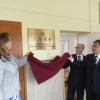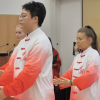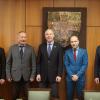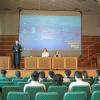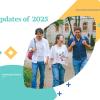Transformative power
2025
Feb
10
.png)
The European Digital UniverCity (EDUC) is celebrating its 5th anniversary, and the University of Pécs has been a member of the alliance from the very beginning. Professor István Tarrósy, Director of the International Centre, plays a key role in the alliance and its development in Pécs. Dr Ágnes Bandiné Temesi, Head of the Institutional EDUC Office at the International Centre of the University of Pécs, and Dávid Molnár, EDUC’s Communications Manager, interviewed him about EDUC’s launch, achievements, and challenges.

You have been involved in shaping EDUC since the beginning. Could you share with us the early moments of the European university alliance? How did the University of Pécs join this initiative in 2018?
It all started with an unexpected but important phone call for the University of Pécs. My friend Jan Pavlik, then Director of International Relations at Masaryk University in Brno, asked if we had seen the European Commission’s call for proposals on European University Alliances and what we thought about it. He told me that an alliance was forming, and they would be delighted to welcome the University of Pécs.
I was familiar with the call, but the deadline was extremely tight to find partners to apply together. However, Brno had already made significant progress in negotiations with French, German, and Italian partners—who now form the backbone of EDUC. It was an obvious decision to say yes:
Rector Miseta and the entire leadership of the University of Pécs immediately supported the idea.
This happened in early December 2018, and we had only two to three weeks to draft the Pécs section of the application under intense pressure.
We were happy to join the emerging EDUC Alliance, becoming its sixth member in the first round of applications. By 2019, when the alliance officially launched, we were already among the first winning consortia. That was a great source of pride for us. We held a pre-kickoff meeting in Pécs, which I hope was memorable for all our allies. Right from the start, we declared that although we were the last to join this intellectual circle, we were eager to participate with the highest intensity. We enthusiastically and energetically threw ourselves into the “alliance game.”

Could you also outline what led to the core idea of EDUC at a European level?
Around 2017, a grand vision began to take shape: making Europe more competitive by reforming the European higher education and research space. I believe the past five years have been about understanding this vision and then determining how to align resources at European, national, and local levels to establish real alliances.
Throughout history, alliances in international relations have always meant close cooperation for a specific cause.
EDUC represents a fundamentally new approach: together, we are defining how universities collaborate in Europe and worldwide within a new, deep strategic framework—thinking decades ahead.
Additionally, this entails a new culture of cooperation for alliance members and partners.

What are the strongest connections that EDUC is building among students, academics, and administrative staff?
The most significant progress has been in administrative collaboration. By administration, I mean that university leadership and the units that run institutions daily—from international offices to libraries—have begun working together more closely. They are building bridges that play a major role in academic exchanges, the coordination of student programmes, and the overall integration of institutions. Of course,
this wouldn’t be possible without the commitment of university leaders. Coordinated decision-making is essential for long-term thinking.
Over the past five years, EDUC’s strategic framework has evolved significantly. For example, this year saw the launch of the EDUC subproject, EDUC-WIDE, which specifically aims to strengthen cooperation among researchers and administrative networks. It focuses on key pillars such as career development, research reforms, open science principles, and methodological and research outputs.

What achievements are you most proud of from this period? Where should we focus our efforts moving forward? 
For me, the key question is whether this transformative power, which enhances competitiveness, is also manifesting at the local level. I believe it is! At the University of Pécs, colleagues from the administration, research, academic, and student sectors are developing joint educational programmes and courses within the framework of EDUC. Various offices are beginning to collaborate more closely, leading to a real transformation in attitudes and approaches at the local level.
A community is forming in which it will be completely natural in the long run for EDUC to set the priority framework for the future of alliance universities. I believe we have made significant progress in this regard. This will be one of the keys to success, and we are heading in the right direction.
There are currently 64 university alliances in Europe, each pursuing different goals. Is there potential for collaboration between alliances?
On the one hand, the European Commission actively encourages cooperation between alliances. On the other, there is a natural curiosity to see what other alliances are doing well.
Sharing best practices on common platforms benefits everyone.
At the same time, it is also important to be aware of the difficulties and challenges.
For instance, a key question is how these alliances can function as independent entities in the long run—ensuring that member institutions do not dissolve into the new structure while still operating under a new framework. Can we establish EDUC as a standalone legal entity, such as a foundation, association, or company, that can function legally and enable stronger fundraising?
This interview is based on an episode of the EDUCast podcast. More details can be found in the podcast:
- Log in to post comments
University of Pécs | Chancellery | IT Directorate | Portal group - 2020.
